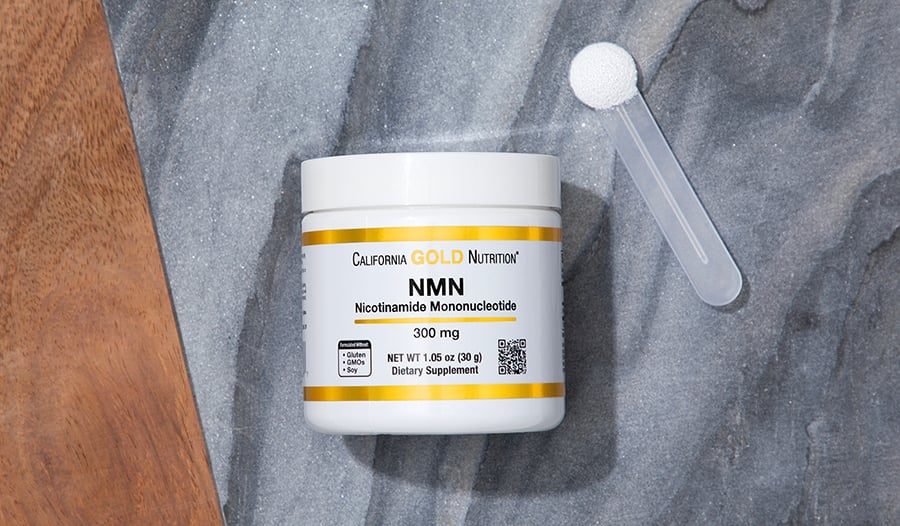5 Promising Health Benefits of NMN (Nicotinamide Mononucleotide)
DISCLAIMER:This blog does not intend to provide diagnosis...
- In this article:
- What Is NMN (Nicotinamide Mononucleotide)?
- NMN Food Sources
- NMN Health Benefits
- 4. NMN May Promote Weight Management
- 5. NMN May Promote Longevity
- Takeaway

In recent years, NMN has gained interest not only among scientists and researchers but also among the general public. This super supplement has gained popularity as a staple for those interested in achieving optional wellness.
NMN has also been studied for a variety of health benefits ranging from weight management to increasing the life span.
What exactly is NMN? Is this supplement just a fad, or is there a reason why NMN is gaining so much attention? Research suggests that NMN has some pretty interesting health benefits. Using an NMN supplement may be the best way to receive all that this amazing molecule has to offer.
What Is NMN (Nicotinamide Mononucleotide)?
Nicotinamide mononucleotide or NMN is a molecule that is created from nicotinamide, a form of vitamin B3 or niacin. NMN can also be synthesized from nicotinamide riboside, another form of vitamin B3.
In the body, NMN acts as a precursor to the molecule nicotinamide adenine dinucleotide, which is often abbreviated as NAD. NAD is a molecule created in the body after vitamin B3 and its various forms, like NMN, are ingested. NAD functions as a coenzyme for many different enzymatic reactions in the body. A coenzyme is a molecule that is not a protein and is necessary for an enzyme to perform its function. NAD plays a crucial role in the metabolism and energy production of cells. It acts as one of the chief molecules that participate in the oxidation and reduction reactions in the body. NAD also plays a part in the repair of deoxyribonucleic acid (DNA), the regulation of the cellular aging process, and even cellular immune function.
In the body and with supplements, NAD comes in two forms: an oxidized, or electron-gaining, form known as NAD+ and a reduced, or electron-donating, form NADH. Once ingested, NMN is most often converted to the oxidized form of NAD, NAD+.
NMN Food Sources
NMN can be found naturally in very small amounts in certain foods like avocados, cucumbers, broccoli, mushrooms, and cabbage.
Research suggests that the bacteria that make up the gut microbiome may also produce NMN, but dietary sources and gut bacteria may not produce enough NMN to benefit the body. By the time an individual reaches the age of 40 and beyond, the NAD levels in the body have been reduced by half of that in younger ages. Lower levels of NAD have been associated with less energy production, deoxyribonucleic acid (DNA) damage, increased free radical damage, inflammation, and cognitive decline.
While research shows that NAD in the body can be increased by caloric restriction, fasting, and exercise, NMN supplementation may be the quickest and most effective way to increase NAD+ levels in the body.
NMN Health Benefits
Research indicates that NMN may have a wide range of health benefits, like improving muscle tone, regulating blood sugar levels, enhancing cognition, decreasing weight, and increasing longevity. Here are 5 benefits associated with NMN supplements.
1. NMN May Increase Muscle Strength
With aging comes a decrease in muscle strength. Research shows that there is a decrease of approximately 3-8% of muscle mass per decade after an individual reaches 30 years old.
This muscle mass loss is accelerated after the age of 60 and contributes to frailty and decreased muscle strength in older individuals.
Studies suggest that NMN supplements may help to improve muscle strength. One double-blind, randomized, placebo-controlled study followed 42 men aged 65 or older for 6 or 12 weeks.
These men were given 250 mg of NMN per day, and muscle strength was tested via a grip strength test and a measurement of walking speed.
After the study, the group that took the NMN was found that have a slight improvement in grip strength and walking speed. Furthermore, there were no significant adverse effects associated with NMN supplementation.
2. NMN May Help Regulate Blood Sugar
While some studies suggest that niacin therapy may raise blood sugar or glucose levels and contribute to an increased risk of the development of diabetes, NMN may help to improve insulin responses in those with pre-diabetes.
One double-blind, randomized, placebo-controlled study followed 25 postmenopausal women who had been diagnosed with pre-diabetes and were overweight for 10 weeks.
The participants took NMN supplements during the study and were assessed for insulin sensitivity.
Insulin is a hormone that helps to bring glucose from the bloodstream into the cells so that it can be used as energy for the body. Insulin also directs the body to store glucose for later use.
Individuals with pre-diabetes often have a lowered response to insulin, making their blood glucose levels higher than a of healthy individuals.
The study found that NMN supplementation over 10 weeks helped to increase muscle responses to insulin in women with pre-diabetes. This finding was not observed in the placebo group.
3. NMN May Help Enhance Cognition
One of the most common effects of aging is a decrease in cognition. Studies suggest that there is a steady decline in cognition processing speed starting at the age of 20 years old.
This decline in cognition is thought to be due to a variety of factors, including inflammation, increased amounts of oxidative stress or free radical damage, and less blood flow to the small blood vessels of the brain. NMN may help to decrease cognitive decline.
Animal studies have found using NMN supplements helped to increase the blood flow to the small blood vessels of the brains of rats. After NMN supplementation, the rats had improved walking speeds and spatial awareness.
Another animal study involving 40 older rats found that NMN and melatonin supplementation helped improve memory, as well as protect mitochondrial function. Mitochondria are the tiny organelles within cells that create energy for the body. The study also found that NMN and melatonin helped to protect brain cells from oxidative stress.
While animal studies are promising, there are ongoing human trials concerning the effects of NMN on cognition.
4. NMN May Promote Weight Management
With increasing age comes unwanted pounds. Many individuals find it harder to lose weight during middle age because of hormonal changes, less time for physical activity, and mood disorders like depression. Studies indicate that NMN may promote weight management and even change body composition.
One animal study found that NMN supplementation reduced the amount of body fat in obese mice. Furthermore, supplementing with NMN also increased lean body mass and improved blood lipid levels. The lower blood lipid levels were associated with a lower risk for fatty liver disease.
Animal studies suggest that NMN may also benefit the offspring of overweight mothers. One study found that the offspring mice of obese mothers had an impaired metabolism and were more likely to be obese themselves.
NMN supplementation helped to improve the metabolism of the offspring mice and increased their mitochondrial function. The study also found that there was a marked reduction in the accumulation of fat around the livers of the offspring mice due to NMN.
5. NMN May Promote Longevity
Research suggests that NMN may be a powerful anti-aging supplement. With aging, mitochondria begin to produce less energy because of lower levels of NAD+. This decrease in energy leads to a faster breakdown of body tissues and organs like the heart, lungs, skeletal muscle, and brain.
Since NMN is readily converted to NAD+ in the body, this powerhouse supplement offers the body a steady and readily available supply of NAD+ for its metabolic needs.
Studies indicate that NMN may help to increase longevity. One double-blind randomized placebo-controlled study followed 80 healthy middle-aged adults who supplemented with placebo or NMN for 60 days. The study found that those in the NMN group had a statistically significant increase in walking distance compared to the placebo group. The study also measured the blood biological age in both groups and found that there was no change in the NMN group, while there was a significant increase in blood age in the placebo group.
Furthermore, the study looked at a subjective health assessment and found that those taking NMN supplements felt better overall compared to the placebo group.
Takeaway
While human trials and research continue to bring the health benefits of NMN supplements to light, adding this powerful supplement to a healthy routine may help to provide optimal wellness well into old age.
References:
- Volpi E, Nazemi R, Fujita S. Muscle tissue changes with aging. Curr Opin Clin Nutr Metab Care. 2004;7(4):405-410. doi:10.1097/01.mco.0000134362.76653.b2
- Igarashi M, Nakagawa-Nagahama Y, Miura M, et al. Chronic nicotinamide mononucleotide supplementation elevates blood nicotinamide adenine dinucleotide levels and alters muscle function in healthy older men. NPJ Aging. 2022;8(1):5. Published 2022 May 1. doi:10.1038/s41514-022-00084-z
- Goldie C, Taylor AJ, Nguyen P, et al Niacin therapy and the risk of new-onset diabetes: a meta-analysis of randomised controlled trials Heart 2016;102:198-203.
- Yoshino M, Yoshino J, Kayser BD, et al. Nicotinamide mononucleotide increases muscle insulin sensitivity in prediabetic women. Science. 2021;372(6547):1224-1229. doi:10.1126/science.abe9985
- Murman DL. The Impact of Age on Cognition. Semin Hear. 2015;36(3):111-121. doi:10.1055/s-0035-1555115
- Tarantini S, Valcarcel-Ares MN, Toth P, et al. Nicotinamide mononucleotide (NMN) supplementation rescues cerebromicrovascular endothelial function and neurovascular coupling responses and improves cognitive function in aged mice. Redox Biol. 2019;24:101192. doi:10.1016/j.redox.2019.101192
- Hosseini L, Farokhi-Sisakht F, Badalzadeh R, Khabbaz A, Mahmoudi J, Sadigh-Eteghad S. Nicotinamide Mononucleotide and Melatonin Alleviate Aging-induced Cognitive Impairment via Modulation of Mitochondrial Function and Apoptosis in the Prefrontal Cortex and Hippocampus. Neuroscience. 2019;423:29-37. doi:10.1016/j.neuroscience.2019.09.037
- Zhang Y, Zhu W, Wang M, Xi P, Wang H, Tian D. Nicotinamide mononucleotide alters body composition and ameliorates metabolic disorders induced by a high-fat diet. IUBMB Life. 2023;75(6):548-562. doi:10.1002/iub.2707
- Uddin GM, Youngson NA, Chowdhury SS, Hagan C, Sinclair DA, Morris MJ. Administration of Nicotinamide Mononucleotide (NMN) Reduces Metabolic Impairment in Male Mouse Offspring from Obese Mothers. Cells. 2020;9(4):791. Published 2020 Mar 25. doi:10.3390/cells9040791
- Takeda K, Okumura K. Nicotinamide mononucleotide augments the cytotoxic activity of natural killer cells in young and elderly mice. Biomed Res. 2021;42(5):173-179. doi:10.2220/biomedres.42.173
- Shade C. The Science Behind NMN-A Stable, Reliable NAD+Activator and Anti-Aging Molecule. Integr Med (Encinitas). 2020;19(1):12-14.
- Yoshino J, Baur JA, Imai SI. NAD+ Intermediates: The Biology and Therapeutic Potential of NMN and NR. Cell Metab. 2018;27(3):513-528. doi:10.1016/j.cmet.2017.11.002
- Yi L, Maier AB, Tao R, et al. The efficacy and safety of β-nicotinamide mononucleotide (NMN) supplementation in healthy middle-aged adults: a randomized, multicenter, double-blind, placebo-controlled, parallel-group, dose-dependent clinical trial. Geroscience. 2023;45(1):29-43. doi:10.1007/s11357-022-00705-1
- Nadeeshani H, Li J, Ying T, Zhang B, Lu J. Nicotinamide mononucleotide (NMN) as an anti-aging health product - Promises and safety concerns. J Adv Res. 2021;37:267-278. Published 2021 Aug 11. doi:10.1016/j.jare.2021.08.003

 By Dr. Candace Mathers, N.D.
By Dr. Candace Mathers, N.D.


